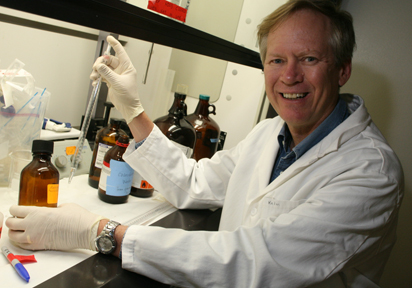The afternoon sunlight streams through the large, picture window framing the San Francisco Peaks over Paul Keim’s shoulder. As director of NAU’s Center for Microbial Genetics and Genomics, Keim sits in a seemingly peaceful and serene office, an odd juxtaposition for a man protected behind three levels of security.
|
That is because Keim is a government operative—but perhaps not in the traditional sense of the term.
A world-renowned expert in microbial forensics, Keim earned the nickname “bioterrorism warrior” in the media for his involvement in identifying strains of anthrax used in terrorist attacks in 1993 and 2001. Recently named interim chair for the U.S. National Science Advisory Board for Biosecurity, Keim finds himself the spokesperson when significant scientific findings are released.
“As part of the board, I am assigned various tasks by the White House that may lead to policy recommendations,” he says. “We form committees and working groups, hold open forums and seek input from panels when needed.”
The board comprises experts in infectious diseases, various aspects of biology, biosafety, public health, national security and law enforcement from each branch of government and from prestigious research institutes such as Princeton, Stanford and Tufts University.
In the realm of research, private ventures face little government regulation or restriction. The board exists to consider the risks versus benefits of biological research and recommend effective handling and communication of results. Their recommendations are reported to the secretary of the Department of Health and Human Services.
In May, Keim was asked to review and determine potential threats for the dual-use of synthetic biology carried out by the J. Craig Venter Institute. The institute’s team of researchers synthesized DNA to create a complete genome of an existing bacterial species, inserted it into a different bacterial species host cell, which then programmed the genome and reproduced. The result was a colony of bacterial cells created through what is referred to as “synthetic biology.”
The institute’s scientific feat has gained worldwide attention and prompted President Barack Obama’s executive order on May 20 that requests official research and reporting on synthetic biology. The Presidential Commission for the Study of Bioethical Issues will review potential opportunities for medical advancement like vaccine development while weighing possible ethical, environmental and security concerns.
Keim views the institute’s scientific milestone as an opening to more complex genetic engineering in the future, including complex industrial applications to make difficult-to-synthesize chemicals, such as therapeutic pharmaceuticals.
“It’s not surprising as the research was going in this direction,” he says. “Similar single-gene research has led to breakthroughs in the study of diseases such as diabetes and the production of insulin.”
Assessing the potential risk to biosecurity, Keim says that the cost and time involved in this research make it prohibitive to replicate. The institute’s efforts spanned 15 years at a cost of $40 million.
As research facilities throughout the country strive to define the structure of viruses and bacteria and develop treatments for diseases, the board will continue its efforts to safeguard against misuse of scientific information.
Keim has been a member of the board since its inception in 2004. He will lead as interim chair, a position he says could last for months or years.
As far as being identified as a government operative with access to classified documents, Keim smiles and says, “In 15 years I’ve heard almost nothing that’s top secret that anyone would find interesting.”



